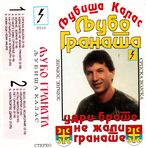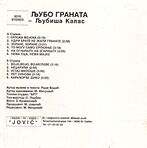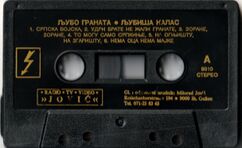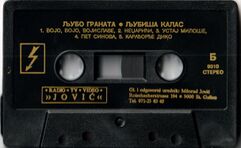Ljubo Granata: Difference between revisions
Generacide (talk | contribs) m (Made the infobox title non italics (it's impossible to read)) |
(I feel weird about submitting an article with a self-insertion involved) |
||
| Line 1: | Line 1: | ||
{{Infobox album | {{Infobox album | ||
| name = Љубо Граната | | name = Љубо Граната | ||
| type = studio | | type = studio | ||
| artist = [[Ljubiša Kalas|Љубиша Калас]] | | artist = [[Ljubiša Kalas|Љубиша Калас]] | ||
| cover = | | cover = LjuboGranata-RTVJ-jcard-front-RA20K.jpg | ||
| caption = RTVJ release | | caption = RTVJ release | ||
| released = 1993 | | released = 1993 | ||
| genre = Novokompovana | | genre = [[Novokompovana narodna muzika|Novokompovana]] | ||
| length = 32:29 | |||
| label = [[Master Music Company|Master]] | | label = [[Master Music Company|Master]] | ||
| prev_title = Crna žena | | producer = [[Milan Jovičić|М. Јовичић]] | ||
| prev_title = [[Crna žena]] | |||
| prev_year = 1991 | | prev_year = 1991 | ||
| next_title = [[Vera pravoslavna|Вера православна]] | | next_title = [[Vera pravoslavna|Вера православна]] | ||
| Line 15: | Line 16: | ||
}} | }} | ||
Ljubo | '''''Ljubo Granata''''' (Serbian Cyrillic: Љубо Граната), commonly referred to as ''Udri brate ne žali granate'', is the fourth studio album and first war-related album by singer [[Ljubiša Kalas]], released some time in 1993 by the Master Music Company. While not much is known about the album, it is assumed that the title's namesake was a nickname for Kalas during the war. | ||
== Background == | == Background== | ||
[ | ''Ljubo Granata''<nowiki/>'s contents, while still patriotic in nature, has a melodramatic and tragic tone compared to other albums made in its time. This would be the third time Ljubiša Kalas would work with lyricist Rade Vidić with the first being 1990's ''[[Ljubiša Kalas (Album)|Ljubiša Kalas]]'' and the second being 1991's ''[[Crna žena]]''. As a result, Kalas would sing "Karađorđe diko", a song that was also performed by Vojslav Tintor two years prior<ref>[https://www.youtube.com/watch?v=r2jsXTWx9MY Vojislav Vojo Tintor Karadjordje, diko Audio 1991 HD]. Српска Архива. 28 September 2018. Retrieved 4 October 2023.</ref>. The song, "Nema oca, nema majke" was originally from the 1990 album Ljubiša Kalas. Originally titled "Nema oca da pokosi travu",<ref>[https://www.youtube.com/watch?v=bDPy5c7jcWQ Ljubisa Kalas - Nema oca da pokosi travu - (Audio 1990)]. Diskos Official. 31 August 2018. Retrieved 4 October 2023.</ref> it was included to fit the theming of the album, though the arranger would be left uncredited. The song, "Zorane, Zorane" would be about Zoran Borovini, a commander who was killed in action a year prior. | ||
== Release == | ==Release== | ||
''Ljubo | ''Ljubo Granata'' was released some time in 1993 by the Master Music Company. It was also released by RTVJ for Swiss distribution, though the last track prematurely fades out. Due to overlapping staff (mainly engineer Sead Lorbek and the arranger Miki Mitrović) and Master typically acquiring albums from other companies, it is speculated that Jugohit was the original distributor of the album, though there has been nothing to substantiate the claim. | ||
The song " | The song "Udri brate ne žali granate" would receive radio play and in present day, "Zorane, Zorane" would have a cult following. With Master and RTVJ defunct, and surviving uploads and scan in low quality, the master of the album is lost. On Christmas Day, 2022, user RandomAtribute20k would upload the album in better quality, though the last track would be prematurely cut off due to the Swiss version being used. | ||
== Track listing == | ==Track listing== | ||
{{Track listing | {{Track listing | ||
| headline = Side A | | headline = Side A | ||
| Line 39: | Line 40: | ||
| length5 = 3:05 | | length5 = 3:05 | ||
| title6 = [[Nema oca, nema majke|Нема оца, нема мајке]] | | title6 = [[Nema oca, nema majke|Нема оца, нема мајке]] | ||
}}{{Track listing | }} | ||
{{Track listing | |||
| headline = Side B | | headline = Side B | ||
| title1 = [[Vojo, Vojo, Vojislave|Војо, Војо, Војиславе]] | | title1 = [[Vojo, Vojo, Vojislave|Војо, Војо, Војиславе]] | ||
| Line 53: | Line 55: | ||
| total_length = 32:29 | | total_length = 32:29 | ||
}} | }} | ||
* Time for "Nema oca, nema majke" is not listed | |||
*Time for songs are slightly shorter than what is listed on the j-card. | |||
* | ==Personnel== | ||
* | |||
==== Writing ==== | |||
* [[Rade Vidić|Раде Видић]] - Аутор музика и текста | |||
* [[Miki Mitrović|М. Митровић]] - Аутор аранжмана | |||
==== Production ==== | |||
* [[Studio Ar-Ton|"АРТ"]]-Тонкси студио | |||
* [[Sead Lorbek|С. Лорбек]]- Тон-мајстор | |||
* [[Zoran Kuzmanović|З. Кузмановић]]- Фото | |||
* [[Мilan Јовичић|М. Јовичић]]- Продуцент | |||
* М. Митровић- Рецензент | |||
== | ==Variants== | ||
{{Multiple image | |||
| total_width = 800 | |||
| image1 = LjuboGranata-RTVJ-jcard-front-RA20K.jpg | |||
| image2 = LjuboGranata-RTVJ-jcard-back-RA20K.jpg | |||
| image3 = LjuboGranata-RTVJ-jcard-side-A-RA20K.jpg | |||
| image4 = LjuboGranata-RTVJ-jcard-side-B-RA20K.jpg | |||
| header = RTVJ Release (1993) | |||
| footer = Notes | |||
*Excellent audio quality | |||
*Signature injected gold labels | |||
*Signature black matte cassette | |||
| align = none | |||
}} | |||
== | == References == | ||
<references /> | |||
[[Category:Albums]] | [[Category:Albums]] | ||
Revision as of 03:49, 5 October 2023
| Љубо Граната | ||||
|---|---|---|---|---|
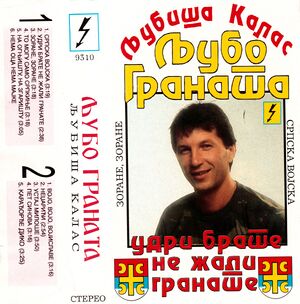 RTVJ release | ||||
| Studio album by | ||||
| Released | 1993 | |||
| Genre | Novokompovana | |||
| Length | 32:29 | |||
| Label | Master | |||
| Producer | М. Јовичић | |||
| Љубиша Калас chronology | ||||
| ||||
Ljubo Granata (Serbian Cyrillic: Љубо Граната), commonly referred to as Udri brate ne žali granate, is the fourth studio album and first war-related album by singer Ljubiša Kalas, released some time in 1993 by the Master Music Company. While not much is known about the album, it is assumed that the title's namesake was a nickname for Kalas during the war.
Background
Ljubo Granata's contents, while still patriotic in nature, has a melodramatic and tragic tone compared to other albums made in its time. This would be the third time Ljubiša Kalas would work with lyricist Rade Vidić with the first being 1990's Ljubiša Kalas and the second being 1991's Crna žena. As a result, Kalas would sing "Karađorđe diko", a song that was also performed by Vojslav Tintor two years prior[1]. The song, "Nema oca, nema majke" was originally from the 1990 album Ljubiša Kalas. Originally titled "Nema oca da pokosi travu",[2] it was included to fit the theming of the album, though the arranger would be left uncredited. The song, "Zorane, Zorane" would be about Zoran Borovini, a commander who was killed in action a year prior.
Release
Ljubo Granata was released some time in 1993 by the Master Music Company. It was also released by RTVJ for Swiss distribution, though the last track prematurely fades out. Due to overlapping staff (mainly engineer Sead Lorbek and the arranger Miki Mitrović) and Master typically acquiring albums from other companies, it is speculated that Jugohit was the original distributor of the album, though there has been nothing to substantiate the claim.
The song "Udri brate ne žali granate" would receive radio play and in present day, "Zorane, Zorane" would have a cult following. With Master and RTVJ defunct, and surviving uploads and scan in low quality, the master of the album is lost. On Christmas Day, 2022, user RandomAtribute20k would upload the album in better quality, though the last track would be prematurely cut off due to the Swiss version being used.
Track listing
| No. | Title | Length |
|---|---|---|
| 1. | "Српска војска" | 3:19 |
| 2. | "Удри брате не жали гранате" | 2:38 |
| 3. | "Зоране, Зоране" | 3:18 |
| 4. | "То могу само српкиње" | 3:18 |
| 5. | "На огњишту, на згаришту" | 3:05 |
| 6. | "Нема оца, нема мајке" |
| No. | Title | Length |
|---|---|---|
| 1. | "Војо, Војо, Војиславе" | 3:16 |
| 2. | "Неџарићи" | 2:54 |
| 3. | "Устај Милоше" | 3:50 |
| 4. | "Пет синова" | 3:16 |
| 5. | "Карађорђе дико" | 3:35 |
| Total length: | 32:29 | |
- Time for "Nema oca, nema majke" is not listed
- Time for songs are slightly shorter than what is listed on the j-card.
Personnel
Writing
- Раде Видић - Аутор музика и текста
- М. Митровић - Аутор аранжмана
Production
- "АРТ"-Тонкси студио
- С. Лорбек- Тон-мајстор
- З. Кузмановић- Фото
- М. Јовичић- Продуцент
- М. Митровић- Рецензент
Variants
- Excellent audio quality
- Signature injected gold labels
- Signature black matte cassette
References
- ↑ Vojislav Vojo Tintor Karadjordje, diko Audio 1991 HD. Српска Архива. 28 September 2018. Retrieved 4 October 2023.
- ↑ Ljubisa Kalas - Nema oca da pokosi travu - (Audio 1990). Diskos Official. 31 August 2018. Retrieved 4 October 2023.
